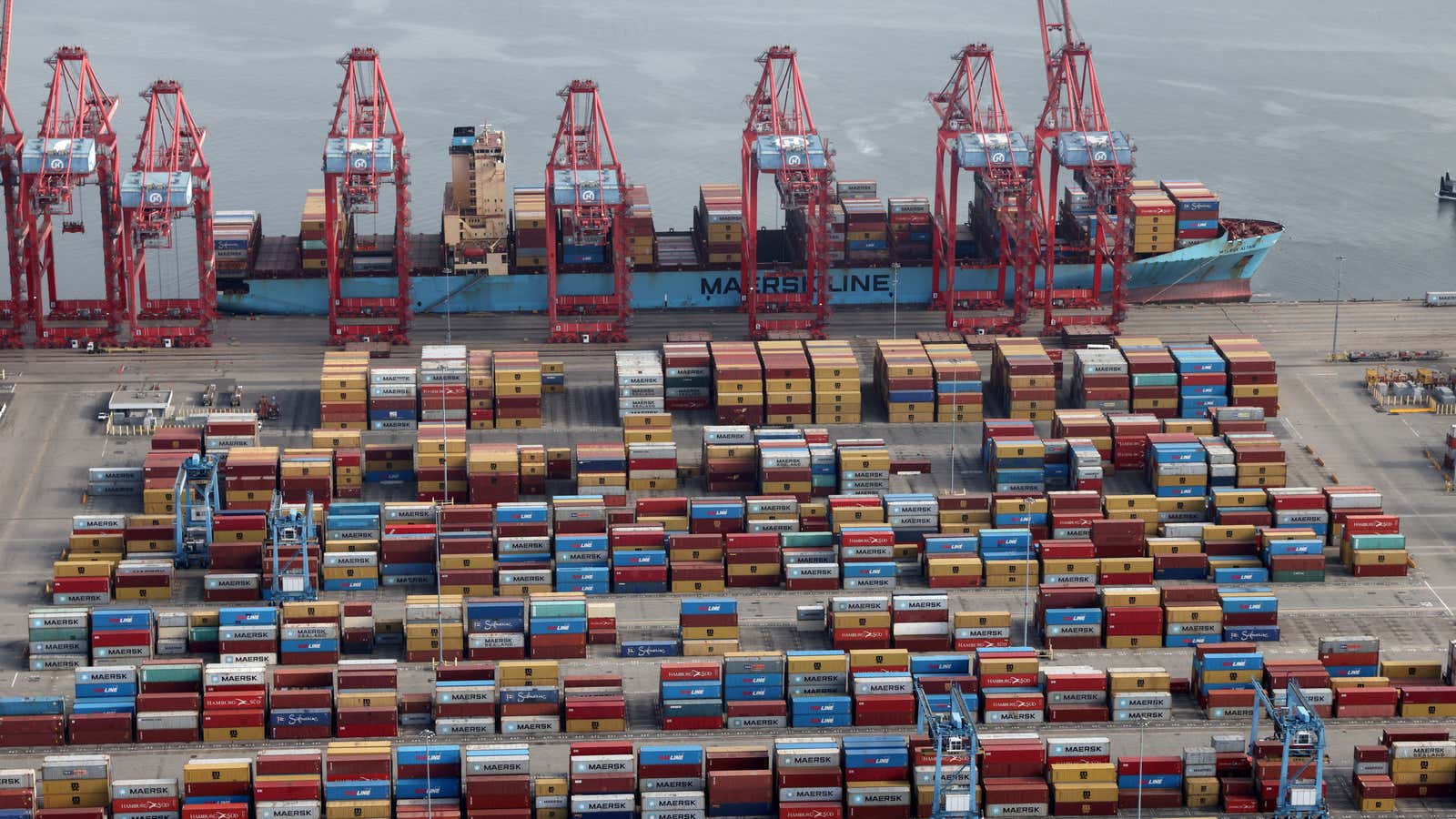Good morning, Quartz readers!
Was this newsletter forwarded to you? Sign up here. Forward to the friend who was sad Quibi didn’t last.
Here’s what you need to know
The US will spend $17 billion to update its ports and waterways. According to CNBC, $4 billion worth of work aimed at easing supply chain holdups will start within the next 60 days as part of the recently passed $1 trillion infrastructure bill. Separately, the bill makes crypto tax-reporting failures a felony.
A Tesla selloff wiped $199 billion from its valuation. Though some investors said the selloff was a “healthy pullback” on what they saw as an overvalued stock, negative headlines over Elon Musk’s Twitter poll certainly didn’t help.
General Electric is splitting into three companies. The new units—focusing on healthcare, aviation, and energy—will be publicly listed.
Electric-vehicle maker Rivian is expected to go public today. The Amazon-backed company has yet to turn a profit, but is nevertheless valued at $70 billion.
European lawmakers accused China of political interference. A special committee urged the EU to create a task force to monitor perceived threats from China on democratic processes.
Despite COP26 promises, world temperatures will increase by 2.4°C by the end of the century. That’s the conclusion from the globe’s top climate analysis coalition, based on countries’ short-term goals.
What to watch for
Starting today, union ballots will be mailed to Starbucks baristas at three coffee shops in the Buffalo area of New York, who will vote on whether to establish the first-ever unionized corporate-owned Starbucks locations in the US. The ballots are due Dec. 8, with the vote count the following day.
1.2%: Share of employees in the US food and services industry that are union members
11.5 million: Employees in the US foodservice and restaurant industry, about 6.5% below February 2020 levels
1: Corporate-owned Starbucks store that is unionized in Canada
2: Number of previous union campaigns the company has faced in the US, including in the early 2000s in New York and in 2019 in Philadelphia
$15: The minimum hourly wage for Starbucks workers by next summer, raised amid unionization efforts
~80: Starbucks workers who are eligible to vote in the Buffalo election
Seoul is joining the metaverse
On Nov. 3, Seoul announced a plan to make a variety of public services and cultural events available in the metaverse, an immersive internet that relies on virtual reality. The metropolitan government will develop its own metaverse platform by the end of 2022. By the time it is fully operational in 2026, it will host a variety of public functions including a virtual mayor’s office, as well as spaces serving the business sector; a fintech incubator; and a public investment organization.
The 3.9 billion won ($3.3 million) investment is part of mayor Oh Se-hoon’s 10-year plan for the city, which aims to improve social mobility among citizens and raise the city’s global competitiveness. It taps into South Korea’s Digital New Deal, a nationwide plan to embrace digital and AI tools to improve healthcare, central infrastructure, and the economy in its recovery from the economic crisis caused by covid-19.
The future of VR, according to Facebook
Meanwhile, Facebook’s rebrand to Meta was just the latest step in the company’s pivot to the metaverse. A close look at Facebook’s slew of VR acquisitions hints at what it thinks the future will look like:
🎮 The company has snapped up five VR game studios in the last three years alone. In June, it bought BigBox VR, the studio behind Population: One, a.k.a. “the Fortnite of VR.”
👯 All of the studios emphasize multiplayer games. Meta also sees the promise of social VR in Supernatural, a workout app with a strong Facebook community, which it bought a day after the company rebrand.
🤳 Facebook is beginning to invest in user-generated content for metaverse-related purposes. It announced a $10 million creator fund for Horizon, its social VR world, in October.
✦ Try a Quartz membership free for seven days to get a full week of our member-only content.
Handpicked Quartz
📱 Netflix has a plan to prove Quibi wasn’t wrong
☝️ More people are staying single—and workplaces need to adjust
💉 The African countries that are expected to meet the WHO’s end-year vaccination target
⚡️ Private investors are finally rivaling public financing of fusion energy
⚔️ Twitter and Facebook are getting caught up in Ethiopia’s escalating conflict
🇬🇧 The UK will allow Indian travelers who got Covaxin to skip quarantine
Surprising discoveries
Heinz can now make ketchup on Mars—in theory. The food maker used tomatoes grown in soil similar to the red planet’s to make the condiment.
Earth’s first continents are much older than we thought. Rock sediments show the continents rose out of the ocean more than 3 billion years ago—700 million years earlier than previously dated.
New Zealand seals are making ill-timed appearances. Once decimated by hunters, a rising seal population has meant more blubbery surprises at kid’s soccer games and on golf courses.
London cabbies’ brains may shed light on Alzheimer’s disease. Researchers are interested in how green badge drivers remember routes on about 26,000 streets.
Hangovers: There’s an ancient amethyst ring for that. At least that’s what archeologists think a purple jewel, found at the site of the Byzantine era’s largest winery, was used to prevent.
Our best wishes for a productive day. Send any news, comments, extraterrestrial produce, and ancient hangover cures to hi@qz.com. Get the most out of Quartz by downloading our iOS app and becoming a member. Today’s Daily Brief was brought to you by Michelle Cheng, Camille Squires, Jasmine Teng, Liz Webber, and Morgan Haefner.
